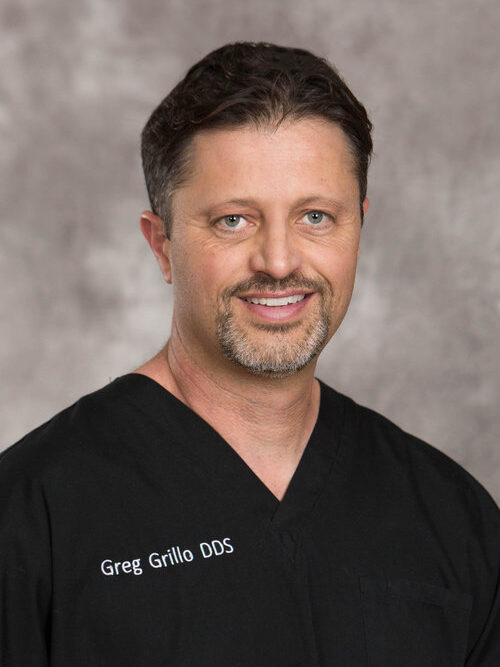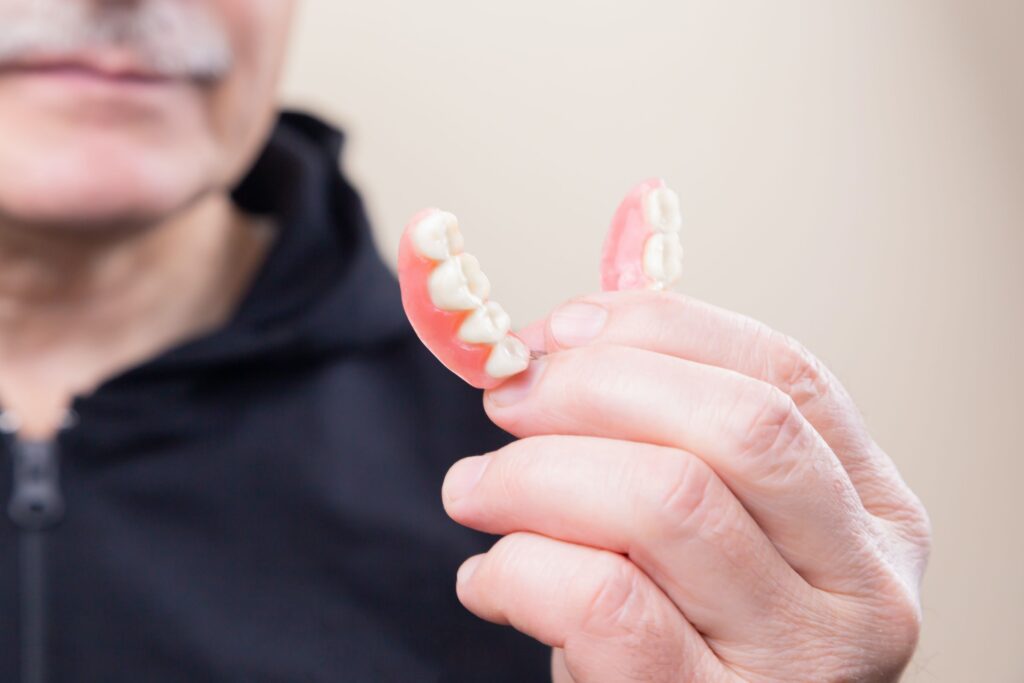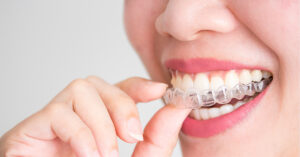Many people lose their natural teeth due to tooth decay, gum disease, injuries, or other causes. Such individuals can experience difficulties in chewing and speaking as well as have cosmetic concerns about their smile. Dentures, also called false teeth, are removable dental appliances that can replace missing natural teeth. Please continue reading for the answers to some commonly asked questions about the different types of dentures.
What are the different types of dentures?
Dentists can use various types of dentures to replace missing teeth. The main options in dentures are as follows:
Full Dentures or Conventional Dentures
Complete or full dentures are removable devices that contain both an upper and lower set of teeth. The materials used to make them include acrylic or porcelain and they have an acrylic or metal base. Dentists recommended full dentures for people who have lost all their teeth. These devices can last 5-10 years with proper maintenance and care.
Partial Dentures
In people who have some remaining natural teeth and some missing teeth, partial dentures are used to fill gaps left behind by the missing teeth. Dentists recommend them for people who have a small number of missing teeth. You can clip on partial dentures and remove them as needed.
Immediate Dentures or Temporary Dentures
Dentists can fit immediate or temporary dentures on the same day that your natural teeth are removed. They allow you to continue having teeth while your jaw heals and can help you get used to wearing dentures.
Flexible Dentures
Nylon or other flexible materials are used to make these types of dentures instead of the more rigid acrylic that is typically used to make traditional dentures. Some people find that flexible dentures, which are a type of partial dentures, are more comfortable. This is especially true for folks who are wearing dentures for the first time. Also, whereas the metal parts of traditional dentures can sometimes be visible, there are no metal parts in flexible types of dentures, so they look and feel more natural.
Overdentures
In some people, dentists can save some teeth and preserve the jawbone. These remaining teeth are used to hold the denture in place and provide stability. Dentists call such a denture an overdenture because it fits over the natural teeth. Dental implants also serve the same purpose as overdentures. Other names for overdentures are snap-on dentures or implant-supported dentures.
What type of dentures are best?
Your dentist can help you choose the best dentures for you. The choice between different types of dentures depends on factors such as your budget, your personal preferences (removable vs permanent dentures), comfort, and your unique dental requirements.
Which dentures are the most comfortable?
In general, many people find flexible dentures to be the most comfortable because they are made of softer materials and do not contain metal parts. These types of dentures adapt to the contours of the gums and do not cause bruising and discomfort. Flexible dentures are also longer lasting than some other types of dentures.
However, not everyone is a candidate for flexible dentures and they are only suitable if the missing teeth are in certain locations. Also, flexible dentures cannot match the bite-strength of traditional implant supported dentures. Lastly, flexible dentures are more prone to buildup of plaque, so they are not a good choice for people with a history of gum disease or those who cannot clean their dentures properly.
Do permanent dentures fit better than immediate dentures?
Permanent dentures are custom-made to fit your mouth and fit better than temporary or immediate dentures. While permanent dentures are more expensive than immediate or temporary dentures, they are a long-term solution and offer better durability and comfort.
On the other hand, immediate dentures allow you to get new teeth immediately, meaning you never have to go out in public without teeth. Also, it’s easier to match the shape and color of your natural teeth that are still present in your mouth when you get immediate dentures.
How long do you have to wait to get dentures after teeth are pulled?
You may need to wait for 4-6 months after your teeth are pulled before you can get dentures. This is because you need to allow your gums to heal after teeth extraction. Also, the dental implants that your dentist places to stabilize your dentures need time to fuse with your jawbone.
As mentioned above, if you want an immediate solution, temporary or immediate dentures can be placed on the same day as your teeth extraction. However, they may need to be remade after your jaw has healed.
What do new dentures feel like?
New dentures can be slightly uncomfortable. Many people experience mild soreness or irritation when they first start wearing a set of dentures. Also, saliva flow can increase temporarily in the beginning. But these changes usually get better over a few weeks’ time as you get used to wearing your new dentures.
How do you care for dentures?
You have to care for your dentures like you would care for your teeth. For example, you need to rinse and brush your dentures daily to remove any food particles and stains. Dentists recommend using a toothbrush with soft bristles to clean dentures to avoid scratching them. When your dentures are not in your mouth, you should store them in clean water. If you’re not sure how to care for your dentures, talk to your dentist. Studies have shown that oral health is closely related to denture care and hygiene habits.
Is it OK to sleep with dentures?
It is not a good idea to sleep with your dentures in your mouth. This can put you at risk of infection. You need to remove most types of dentures before you go to bed. Always clean your dentures and store them as advised by your dentist.
Can you eat steak with dentures?
Different types of dentures have different bite strengths. However, given that eating foods like steak can be difficult even with natural teeth, dentists advise cutting steak into smaller pieces if you wear dentures. This will prevent the dentures from becoming unstable or causing sore spots in your mouth.
Do dentures change your face?
Dentures can restore your smile and make you look more like your old self. This is because missing teeth can lead to sagging of the jaw, protrusion of the chin, sinking of the lips and other changes in your face. Wearing dentures can correct some of these changes.
How much do the best dentures cost?
The cost depends on the types of dentures, materials used to make them, and other factors. It can range anywhere from $750 to $4,000 and above. Indicative costs of dentures are as follows:
- Complete dentures (upper or lower): $1,500 to $3,000
- Immediate dentures (upper or lower): $1,500 to $3,500
- Snap-on dentures (upper or lower): $1,500 to $4,000
- Partial removable dentures: $750 to $2,500
- Overdentures: $1,500 to $4,000
If you want to check the prices of dentures or other dental treatments in your area, call Express Dentist and we’ll put you in touch with a dental office that can give you a quote.
Finding a dentist for dentures
Got further questions about the different types of dentures? Looking for an experienced dentist to make you a set of dentures? Express Dentist can help. We can connect you to top-rated dental professionals in your area who can discuss the options with you. Call Express Dentist today and take the first step towards getting yourself or a loved one a new set of teeth.
About the author

Dr. Greg Grillo
Dr. Greg Grillo DDS studied at the University of Washington where he received a bachelors degree with Honors and later attended dental school on the same campus. Following school Dr. Greg served in the United States Navy as a dental officer. During this time he received advanced training in specialty areas of dentistry while also treating families of members of the military.
As well as sharing valuable information on dentistry and oral health, Dr. Greg remains a practicing dentist to this day. He works with families in the Okanogan Valley where he lives with his wife and three children.
- Dr. Greg Grillo
- Dr. Greg Grillo
- Dr. Greg Grillo
- Dr. Greg Grillo
- Dr. Greg Grillo
- Dr. Greg Grillo
- Dr. Greg Grillo
- Dr. Greg Grillo
- Dr. Greg Grillo
- Dr. Greg Grillo
- Dr. Greg Grillo
- Dr. Greg Grillo
- Dr. Greg Grillo
- Dr. Greg Grillo
- Dr. Greg Grillo
- Dr. Greg Grillo
- Dr. Greg Grillo
- Dr. Greg Grillo
- Dr. Greg Grillo
- Dr. Greg Grillo
- Dr. Greg Grillo
- Dr. Greg Grillo
- Dr. Greg Grillo
- Dr. Greg Grillo
- Dr. Greg Grillo
- Dr. Greg Grillo
- Dr. Greg Grillo
- Dr. Greg Grillo
- Dr. Greg Grillo
- Dr. Greg Grillo
- Dr. Greg Grillo
- Dr. Greg Grillo
- Dr. Greg Grillo
- Dr. Greg Grillo
- Dr. Greg Grillo
- Dr. Greg Grillo
- Dr. Greg Grillo
- Dr. Greg Grillo
- Dr. Greg Grillo
- Dr. Greg Grillo
- Dr. Greg Grillo
- Dr. Greg Grillo
- Dr. Greg Grillo
- Dr. Greg Grillo
- Dr. Greg Grillo
- Dr. Greg Grillo
- Dr. Greg Grillo
- Dr. Greg Grillo
- Dr. Greg Grillo
- Dr. Greg Grillo
- Dr. Greg Grillo
- Dr. Greg Grillo
- Dr. Greg Grillo
- Dr. Greg Grillo
- Dr. Greg Grillo
- Dr. Greg Grillo
- Dr. Greg Grillo
- Dr. Greg Grillo
- Dr. Greg Grillo
- Dr. Greg Grillo
- Dr. Greg Grillo
- Dr. Greg Grillo
- Dr. Greg Grillo
- Dr. Greg Grillo
- Dr. Greg Grillo
- Dr. Greg Grillo
- Dr. Greg Grillo
- Dr. Greg Grillo
- Dr. Greg Grillo
- Dr. Greg Grillo
- Dr. Greg Grillo
- Dr. Greg Grillo
- Dr. Greg Grillo
- Dr. Greg Grillo
- Dr. Greg Grillo
- Dr. Greg Grillo
- Dr. Greg Grillo
- Dr. Greg Grillo
- Dr. Greg Grillo
- Dr. Greg Grillo
- Dr. Greg Grillo
- Dr. Greg Grillo
- Dr. Greg Grillo
- Dr. Greg Grillo
- Dr. Greg Grillo
- Dr. Greg Grillo
- Dr. Greg Grillo
- Dr. Greg Grillo
- Dr. Greg Grillo
- Dr. Greg Grillo
- Dr. Greg Grillo




